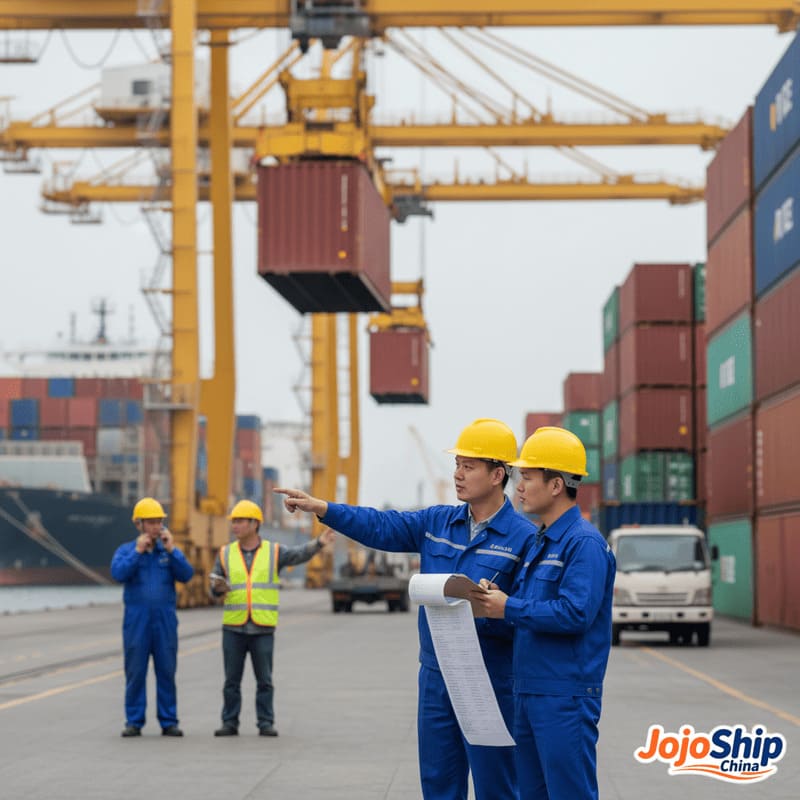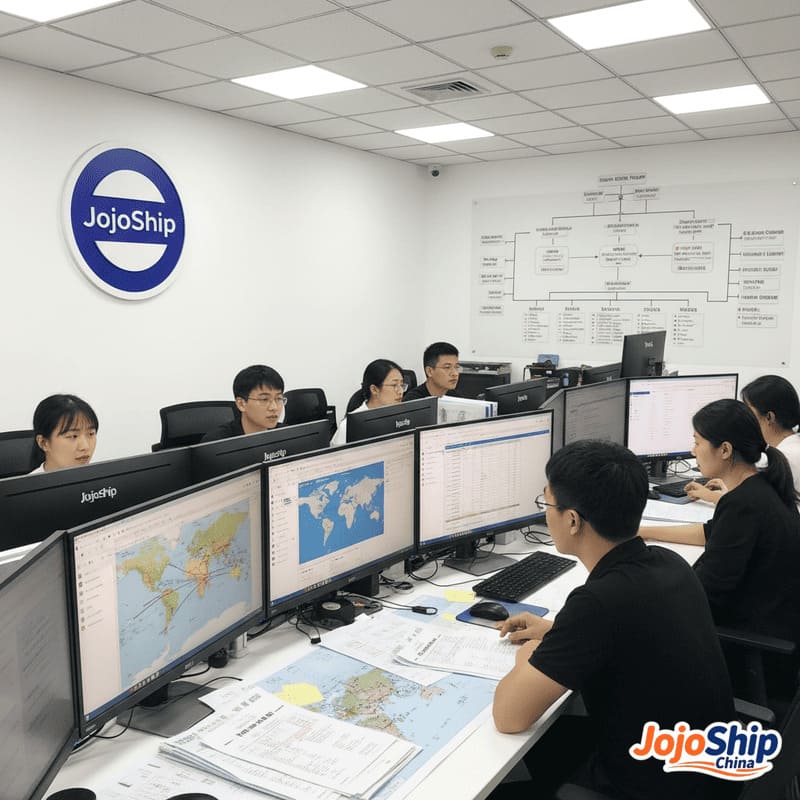Are you drowning in logistics confusion when importing from China? Missing shipments, unexpected costs, and communication nightmares can derail your business. The right shipping agent could solve these problems, but how do you find one you can trust?
To get a Chinese shipping agent, first identify your specific needs, then search online platforms like Alibaba Logistics or Freightos for licensed agents in major export hubs. Verify credentials, request quotes, check references, and test with a small shipment before committing to ensure reliability and service quality.

When I first needed to ship products from China, I made the costly mistake of choosing an agent based solely on price. The resulting delays and miscommunications taught me that finding the right partner requires a systematic approach. Let me share what I've learned to help you avoid the same pitfalls.
Do You Have a Shipping Agent in China?
Are you struggling to manage your China exports on your own? Finding yourself confused by customs regulations or frustrated by carrier negotiations? These common challenges signal it's time to consider professional help.
Yes, at JojoShip China we serve as dedicated shipping agents across major Chinese export hubs including Shenzhen, Shanghai, and Ningbo. We manage sea freight, air freight, and express shipments from China to global destinations, handling documentation, customs clearance, and door-to-door delivery services.

When clients come to us, they've typically already experienced the difficulties of trying to navigate Chinese exports without proper support. I remember when a home goods retailer approached us after their container was held at port for three weeks due to incorrect documentation. Their supplier had assured them everything was handled, but the reality proved otherwise.
Why You Need a Professional Shipping Agent in China
Working without a reliable shipping agent in China creates significant business risks that many importers don't recognize until problems arise:
| Challenge | Without an Agent | With JojoShip's Agent Services |
|---|---|---|
| Documentation Errors | Customs holds, penalties, rejected shipments | Professional preparation of all export documents |
| Hidden Costs | Surprise fees, storage charges, demurrage | Transparent pricing and cost forecasting |
| Carrier Negotiations | Standard rates with no leverage | Discounted shipping rates through volume agreements |
| Contrôle de la qualité | No verification before shipping | Optional pre-shipment inspection services |
| Supplier Coordination | Communication gaps, missed pickups | Direct factory communication in local language |
| Shipment Tracking | Limited visibility once goods leave supplier | Real-time updates through digital platform |
| Résolution des problèmes | No local representation when issues arise | On-the-ground team to address problems immediately |
| Conformité douanière | Potential regulatory violations | Expert handling of export regulations |
I've seen these challenges play out repeatedly over my years in logistics. One particularly memorable case involved a client who had been importing furniture from Guangzhou. Before working with us, they relied on their supplier to arrange shipping. When a customs issue arose, the supplier simply stopped responding. Without anyone in China to represent their interests, they faced weeks of delays and thousands in storage fees.
After becoming our client, we established clear processes for their shipments. When a similar customs question came up six months later, our local team resolved it within hours, preventing any delay in their container's departure. This hands-on problem solving is what professional shipping agents provide that simply cannot be replicated through direct supplier arrangements or online booking platforms.
How to Choose the Right Chinese Shipping Agent for Your Business
Finding the right shipping agent requires careful evaluation across several key dimensions:
| Evaluation Criteria | Questions to Ask | Ce qu'il faut rechercher |
|---|---|---|
| Experience & Expertise | How long have you operated in China? What are your core lanes? | 5+ years in business, specific experience with your destination |
| Licensing & Credentials | Can you provide your MOFCOM license? | Valid freight forwarding license, industry associations |
| Geographic Coverage | Which ports/cities do you cover in China? | Presence in major export hubs relevant to your supply chain |
| Service Scope | Do you offer door-to-door service? What value-added services are available? | Services matching your specific requirements |
| Communication | How and when will you provide updates? Who is my point of contact? | Responsive communication, English proficiency, 24-hour response commitment |
| Technologie | What tracking capabilities do you offer? | Online platform, real-time visibility tools |
| Structure des prix | Can you provide a detailed breakdown of all costs? | Transparent pricing, no hidden fees |
| References | Can you provide references from similar clients? | Positive testimonials from businesses in your industry |
| Résolution des problèmes | How do you handle customs delays or other issues? | Clear escalation procedures, proactive problem-solving approach |
| Contract Terms | What are your payment terms? Is there a minimum commitment? | Flexible terms, reasonable payment schedule |
When we help clients evaluate potential shipping agents, we always emphasize looking beyond the quoted price. The cheapest option often becomes the most expensive once delays, errors, and hidden charges are factored in. Instead, focus on value – the agent whose services will minimize your total landed cost and business disruption.
Step-by-Step Process to Find and Hire a Chinese Shipping Agent
Based on my experience helping hundreds of businesses establish reliable shipping channels from China, here's the process I recommend:
1. Define Your Specific Requirements
Before starting your search, clearly identify:
- Shipping volume and frequency - Will you ship weekly, monthly, or seasonally?
- Cargo type - Standard products, dangerous goods, oversized items?
- Service needs - Just port operations or full door-to-door service?
- Budget constraints - What are you willing to pay for reliability and service?
- Special requirements - Do you need warehousing, consolidation, or specific documentation?
I remember working with a client who initially requested only basic shipping services but later needed warehouse space in China for quality control. Because they hadn't considered this upfront, they had to scramble to find additional services midway through their busy season. Defining comprehensive requirements from the start would have prevented this disruption.
2. Research Potential Agents
With requirements defined, identify potential partners through:
- Online platforms - Alibaba Logistics, Freightos, or Made-in-China
- Industry referrals - Ask other importers in your network
- Trade shows - Major logistics events in China or your country
- Trade associations - Many publish directories of verified service providers
- LinkedIn - Search for logistics professionals in key Chinese cities
Focus your search on agents based in the regions where your suppliers are located. If most of your manufacturing is in Guangdong province, prioritize agents with strong operations in Shenzhen or Guangzhou. This local presence enables more efficient pickup and problem resolution.
3. Verify Credentials and Reputation
Before contacting potential agents, conduct due diligence:
- License verification - Confirm they hold a valid MOFCOM freight forwarding license
- Company age - Established companies (5+ years) typically offer more stability
- Online reviews - Check multiple platforms for consistent feedback
- Physical presence - Confirm they have actual offices, not just a virtual address
- Financial stability - Where possible, verify they're financially sound
One technique I use is searching the agent's name along with words like "scam," "complaint," or "problems" to uncover any red flags. While occasional negative reviews are normal, patterns of similar complaints should be taken seriously.
4. Contact and Interview Potential Agents
Prepare a detailed inquiry including:
- Brief company introduction
- Specific shipping requirements
- Upcoming shipment details
- Request for service capabilities and pricing
When contacting agents, pay close attention to:
- Response time - Good agents typically respond within 24 hours
- Communication clarity - Is their English proficient enough for complex discussions?
- Question handling - Do they address all your queries or avoid certain topics?
- Professionalism - Is their response customized or clearly generic?
During my early days in logistics, I learned the importance of this evaluation step when I encountered an agent who responded quickly to initial inquiries but became increasingly difficult to reach once we started working together. Their initial responsiveness turned out to be just a sales tactic rather than representative of their actual service level.
5. Request and Compare Detailed Quotes
Ask shortlisted agents to provide:
- Comprehensive rate sheets for your routes
- Breakdown of all fees and surcharges
- Service level agreements
- Documentation requirements
- Payment terms and methods
When comparing quotes, look beyond the bottom-line price to assess:
- What services are included vs. add-ons
- Which costs are fixed vs. variable
- Any minimum charges or volume requirements
- How they handle peak season adjustments
I advise clients to create a standardized comparison sheet, as shipping quotes can be structured very differently, making direct comparisons difficult without normalization.
6. Check References
Before making your final decision:
- Request references from clients with similar shipping profiles
- Prepare specific questions about reliability and problem resolution
- If possible, speak directly with references rather than just reading testimonials
- Ask about both routine shipments and how the agent handled unexpected problems
When I'm helping clients select a shipping agent, I always insist on speaking with at least two current clients. The most revealing question I ask is: "What was the biggest problem you experienced with this agent, and how was it resolved?" The answer tells you not only about potential weaknesses but also about their problem-solving approach.
7. Start with a Trial Shipment
Before committing to a long-term agreement:
- Begin with a single, non-urgent shipment
- Document clear expectations for the trial
- Evaluate communication, documentation accuracy, and timeline adherence
- Request detailed tracking and updates throughout the process
This trial period is crucial. I've seen companies rush into annual contracts only to discover fundamental incompatibilities that could have been identified with a single test shipment.
8. Establish Clear Operating Procedures
Once you've selected your agent:
- Develop standard operating procedures
- Create clear communication protocols
- Establish regular performance reviews
- Define escalation paths for urgent issues
- Set measurable KPIs for ongoing evaluation
I work with all new clients to create a customized shipping playbook that documents exactly how we'll manage their shipments. This prevents misunderstandings and ensures consistent service regardless of which team member handles their cargo on any given day.
Working Effectively With Your Chinese Shipping Agent
Finding the right agent is just the beginning. To maximize the value of this relationship:
1. Maintain Clear Communication
- Provide complete information for each shipment
- Establish primary and backup contacts on both sides
- Set expectations for update frequency and format
- Use written confirmation for all important instructions
2. Plan Ahead
- Share shipment forecasts when possible
- Alert your agent to seasonal peaks in advance
- Provide ample lead time for complex shipments
- Discuss potential challenges before they arise
3. Build a True Partnership
- Treat your agent as a strategic partner, not just a vendor
- Share business goals and growth plans
- Be open to their suggestions for improvements
- Recognize that mutual success drives better service
In my experience, the clients who get the best service from shipping agents are those who view the relationship as a partnership rather than a transaction. When we understand your business objectives, we can often suggest logistics solutions you might not have considered.
4. Regular Performance Reviews
- Schedule quarterly reviews of key performance metrics
- Discuss both successes and areas for improvement
- Revisit pricing and service levels annually
- Adjust procedures based on changing business needs
One of our longest-standing clients has a monthly call with our team to review all shipments from the previous month. This regular check-in helps us identify small issues before they become major problems and continuously refine our service to their specific needs.
Conclusion
Finding a reliable Chinese shipping agent requires careful research, thorough verification, and systematic testing, but the right partnership will save you time, money, and countless logistical headaches while providing the local expertise and representation essential for successful importing from China.

